New research from the U.K. found that many parents are not aware that their children are overweight unless they are extremely obese. The study showed that nearly one-third of parents underestimated where their child fell on the body mass index (BMI) obesity scale.
“If parents are unable to accurately classify their own child’s weight, they may not be willing or motivated to enact the changes to the child’s environment that promote healthy weight maintenance,” senior author Sanjay Kinra, a clinical epidemiologist at the London School of Hygiene & Tropical Medicine, said in a March 29 news release.
According the Centers for Disease Control and Prevention (CDC), childhood obesity in the U.S. has more than doubled in children and quadrupled in adolescents in the past 30 years. Children and adolescents who are obese are more likely to be obese as adults and therefore at greater risk for adult health problems, including heart disease type 2 diabetes, stroke and many types of cancer. It is no wonder then, that childhood obesity has become a worldwide health concern.
For the study, the parents of 2,976 children responded to a questionnaire about their children’s weight. Among study participants, 369 had children who were very overweight. Analysis of the responses revealed that 31 percent of this group underestimated their child’s weight, and that only four out of the 369 parents identified their child as very overweight or obese.
In addition, the researchers found that parents were more likely to underestimate their child’s weight if they were black or South Asian or were from deprived backgrounds. Parents were also less likely to see their sons as overweight.
The study authors suggested that the parents’ underestimations may stem from a fear of being judged, an unwillingness to a label their child as overweight, and changing perceptions of normal weight because of the increase in body weight at a societal level.
The reported inability of parents to recognize their children’s weight problems raises issues about the effectiveness of existing intervention programs. The researchers hope that understanding the variations in populations will help policymakers better target their obesity-prevention programs and remove this potentially overlooked roadblock to achieving a healthy weight and lifestyle.
“Measures that decrease the gap between parental perceptions of child weight status and obesity scales used by medical professionals may now be needed in order to help parents better understand the health risks associated with overweight and increase the uptake of healthier lifestyles,” Russell Viner, PhD, an academic pediatrician at the UCL Institute of Child Health, said in the news release.















